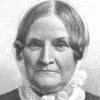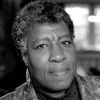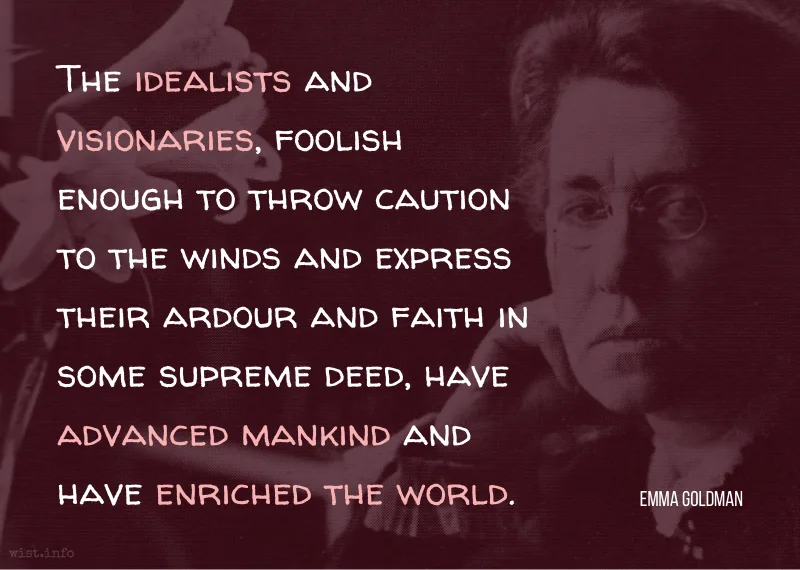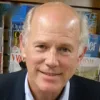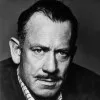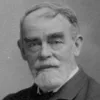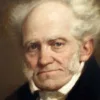Whoso belongs only to his own age, and reverences only its gilt Popinjays or smoot-smeared Mumbojumbos, must needs die with it.
Thomas Carlyle (1795-1881) Scottish essayist and historian
Essay (1832-05) “Boswell’s Life of Johnson,” Fraser’s Magazine, Vol. 5, No. 28
(Source)
Reviewing James Boswell The Life of Samuel Johnson, LL.D.; including a Tour to the Hebrides (1831 ed.). Collected in Critical and Miscellaneous Essays (1827-1855)
Quotations about:
vision
Note not all quotations have been tagged, so Search may find additional quotes on this topic.
Man has always dreamed of power. But damn it, man has always dreamed of love, too, and of the rights of his fellow man. The only power worthy of man is the power of all mankind struggling together toward a goal of unobtainable perfection.
Anthony Boucher (1911-1968) American author, critic, and editor [pseud. of William White; also H. H. Holmes and Herman W. Mudgett]
“The Barrier,” Astounding Science-Fiction, Vol. 30, No. 1 (1942-09)
(Source)
It is impossible to pursue a successful literary career and follow the advice of all one’s “best friends.” I have received severe censure from my orthodox friends for writing liberal verses. My liberal friends condemn my devout and religious poems as “aiding superstition.” My early temperance verses were pronounced “fanatical trash” by others.
With all due thanks and appreciation for the kind motives which interest so many dear friends in my career, I yet feel compelled to follow the light which my own intellect and judgment cast upon my way, rather than any one of the many conflicting rays which other minds would lend me.Ella Wheeler Wilcox (1850-1919) American author, poet, temperance advocate, spiritualist
Poems of Passion, Preface (1883)
(Source)
A book is a version of the world. If you do not like it, ignore it; or offer your own version in return.
Salman Rushdie (b. 1947) Indian novelist
“In Good Faith” (1990), Imaginary Homelands: Essays and Criticism, 1981-1991 (1992)
(Source)
Is this a dagger which I see before me,
The handle toward my hand? Come, let me clutch thee.
I have thee not, and yet I see thee still.
Art thou not, fatal vision, sensible
To feeling as to sight? Or art thou but
A dagger of the mind, a false creation
Proceeding from the heat-oppressèd brain?
I see thee yet, in form as palpable
As this which now I draw.William Shakespeare (1564-1616) English dramatist and poet
Macbeth, Act 2, sc. 1, l. 44ff (2.1.44-53) (1606)
(Source)
Sometimes in a vision, I see a world of happy human beings, all vigorous, all intelligent, none of them oppressing, none of them oppressed. A world of human beings aware that their common interests outweigh those in which they compete, striving toward those really splendid possibilities that the human intellect and the human imagination make possible such a world as I was speaking of can exist if everyone chooses that it should. And if it does exist, if it does come to exist, we shall have a world very much more glorious, very much more splendid, more happy, more full of imagination and happy emotions, than any world that the world has ever known before.
Bertrand Russell (1872-1970) English mathematician and philosopher
Interview by Woodrow Wyatt, BBC TV (1959)
Collected in Bertrand Russell's BBC Interviews (1959) [UK] and Bertrand Russell Speaks His Mind (1960) [US]. Reprinted (abridged) in The Humanist (1982-11/12), and in Russell Society News, #37 (1983-02).
There was a time when all these things would have passed me by, like the flitting figures of a theatre, sufficient for the amusement of an hour. But now, I have lost the power of looking merely on the surface. Everything seems to me to come from the Infinite, to be filled with the Infinite, to be tending toward the Infinite. Do I see crowds of men hastening to extinguish a fire? I see not merely uncouth garbs, and fantastic, flickering lights, of lurid hue, like a trampling troop of gnomes — but straightway my mind is filled with thoughts about mutual helpfulness, human sympathy, the common bond of brotherhood, and the mysteriously deep foundations on which society rests; or rather, on which it now reels and totters.
Lydia Maria Child (1802-1880) American abolitionist, activist, journalist, suffragist
Letters from New-York, # 1, 1841-08-19 (1843)
(Source)
Experience is nearly always commonplace; the present is not romantic in the way the past is, and ideals and great visions have a way of becoming shoddy and squalid in practical life. Literature reverses this process.
Northrop Frye (1912-1991) Canadian literary critic and literary theorist
The Educated Imagination, Talk 3 “Giants in Time” (1963)
(Source)
But to every man of vision the clear Voice speaks; there is no great leadership where there is not a mystic. Nothing splendid has ever been achieved except by those who dared believe that something inside them was superior to circumstance.
Bruce Barton (1886-1967) American author, advertising executive, politician
The Man and the Book Nobody Knows, ch. 1 “The Executive” (1924)
(Source)
Only a child sees things with perfect clarity, because it hasn’t developed all those filters which prevent us from seeing things that we don’t expect to see.
Douglas Adams (1952-2001) English author, humourist, screenwriter
Dirk Gently’s Holistic Detective Agency (1987)
(Source)
When vision fails
Direction is lost.When direction is lost
Purpose may be forgotten.When purpose is forgotten
Emotion rules alone.When emotion rules alone,
Destruction … destruction.
From time immemorial the wise and practical have denounced every heroic spirit. Yet it has not been they who have influenced our lives. The idealists and visionaries, foolish enough to throw caution to the winds and express their ardour and faith in some supreme deed, have advanced mankind and have enriched the world.
Emma Goldman (1869-1940) Lithuanian-American anarchist, activist
Living My Life, Part 2, ch. 39 (1931)
(Source)
THE PROPHET: All cats can see futures, and see echoes of the past. We can watch the passage of creatures from the infinity of now, from all the worlds like ours, only fractionally different. And we follow them with our eyes, ghost things, and the humans see nothing.
Neil Gaiman (b. 1960) British author, screenwriter, fabulist
Sandman, Book 3. Dream Country, # 18 “A Dream of a Thousand Cats” (1990-08)
(Source)
Build movements. Vote with your values, but vote strategically. Voting isn’t a Valentine. It’s a chess move.
Rebecca Solnit (b. 1961) American writer, historian, activist
Facebook (17 Oct 2016)
(Source)
Solnit is credited with the core message of the last two sentences. She indicates (including from that Facebook post) that it was something she had said that was extracted and perhaps tweaked by May Boeve. E.g., "That 2016 aphorism that I sort of said and May Boeve made into this stand-alone slogan." (1 Nov 2018) "I said that off the cuff in 2016 and May Boeve caught it and it went on to have a nice life. It's also not the only chess move you get." (11 Aug 2020).
Variants:
- "Voting is a chess move, not a valentine. And here's the joy of being politically engaged all year round every year; you get to work with a whole lot of chess pieces and players and strategies and long-term visions, so you don't agonize over whether this little hop with a pawn we call voting defines you. You get to define yourself by what you're passionately committed to, by who you align with, by your dreams and your visions, you get to move a lot of pieces a lot of times, you get heroic allies, and you play to win above, beyond, around elections. But you vote, because you know it matters too." (7 Nov 2016)
- "I think of voting as a chess move, not a valentine. It’s just a little part of the picture of how we make the world." ("The 2000 Election Unleashed Disaster on the World. We Can’t Let that Happen Again in 2016," The Nation (3 Nov 2016))
- "A vote is not a valentine. You are not confessing your love for the candidate. It's a chess move for the world you want to live in."
- "Voting isn't a valentine, it's a chess move. Just one of many with one of your many pieces, if you're using what you've been given."
A set of beliefs is at once a way of seeing the world more clearly while, at the same time, foreclosing an alternative vision.
Lillian Rubin (1924-2014) American writer, professor, psychotherapist, sociologist
Intimate Strangers: Men and Women Together (1983)
(Source)
Section reprinted as "The Sexual Dilemma" in Roberta Satow, Gender and Social Life (2000).
Focusing your life solely on making a buck shows a certain poverty of ambition.
Barack Obama (b. 1961) American politician, US President (2009-2017)
Commencement Address, Knox College, Galesburg, IL (4 Jun 2005)
(Source)
The word Martini is a nostalgic passport to another era — when automobiles had curves like Mae West, when women were either ladies or dames, when men wore hats, when a deal was done on a handshake, when boxing and polo were regular pastimes, when we lived for movies instead of MTV, and when jazz was going from hot to cool. It was a time when a relationship was called either a romance or an affair, when love over a pitcher of Martinis was bigger than both of us, sweetheart, and it wouldn’t matter if the Russians dropped the bomb as long as the gin was wet and the vermouth was dry. That as Martini Culture.
Barnaby Conrad III (b. 1952) American author, artist, editor
The Martini: An Illustrated History of an American Classic, “The Great Martini Revival” (1995)
(Source)
Conrad reworked the passage in "Martini Madness" in Cigar Afficionado (Spring 1996):The Martini is a cocktail distilled from the wink of a platinum blonde, the sweat of a polo horse, the blast of an ocean liner's horn, the Chrysler building at sunset, a lost Cole Porter tune, and the aftershave of quipping detectives in natty double-breasted suits. It's a nostalgic passport to another era -- when automobiles had curves like Mae West, when women were either ladies or dames, when men were gentlemen or cads, and when a "relationship" was true romance or a steamy affair. Films were called movies then, the music was going from le jazz hot in Paris to nightclub cool in Vegas, and when a deal was done on a handshake, the wise guy who welched soon had a date with a snub-nosed thirty-eight. Love might have ended in a world war, but a kiss was still a kiss, a smile was still a smile, and until they dropped the atomic bomb there was no need to worry, schweetheart, as long as the vermouth was dry and the gin was wet. That was Martini Culture.
We, or at least I, can have no conception of human life and human thought in a hundred years or fifty years. Perhaps my greatest wisdom is the knowledge that I do not know. The sad ones are those who waste their energy in trying to hold it back, for they can only feel bitterness in loss and no joy in gain.
What the tender poetic youth dreams, and prays, and paints to-day, but shuns the ridicule of saying aloud, shall presently be the resolutions of public bodies, then shall be carried as grievance and bill of rights through conflict and war, and then shall be triumphant law and establishment for a hundred years, until it gives place, in turn, to new prayers and pictures.
Ralph Waldo Emerson (1803-1882) American essayist, lecturer, poet
“Politics,” Essays: Second Series (1844)
(Source)
This quotation is more often given as the paraphrase used by another speaker of the era, the abolitionist Wendell Phillips:What the tender and poetic youth dreams to-day, and conjures up with inarticulate speech, is to-morrow the vociferated result of public opinion, and the day after is the charter of nations.
Phillips used this phrase, prefixed with, "As Emerson says," and in quotation marks, at least twice. First in his lecture "Harper's Ferry" (1 Nov 1859), Brooklyn. Second, in a different context, in "The Scholar in a Republic" (30 Jun 1881), a famous speech at the centennial of the Phi Beta Kappa society at Harvard University.
Emerson did not use this shorter phrasing, however, in any of his written works, and frequent attributions of it to him are in error.
They be blind leaders of the blind. And if the blind lead the blind, both shall fall into the ditch.
[ἄφετε αὐτούς· τυφλοί εἰσιν ὁδηγοὶ [τυφλῶν]· τυφλὸς δὲ τυφλὸν ἐὰν ὁδηγῇ, ἀμφότεροι εἰς βόθυνον πεσοῦνται.]
The Bible (The New Testament) (AD 1st - 2nd C) Christian sacred scripture
Matthew 15:14 (Jesus) [KJV (1611)]
(Source)
Jesus, speaking of the Pharisees. Origin of the English phrase, "the blind leading the blind."
This passage is paralleled in Luke 6:39.
(Source (Greek)). Alternate translations:They are blind men leading blind men; and if one blind man leads another, both will fall into a pit.
[JB (1966)]They are blind leaders of the blind; and when one blind man leads another, both fall into a ditch.
[GNT (1976)]They are blind leaders of the blind; and if one blind person leads another, both will fall into a pit.
[NJB (1985)]They are blind people who are guides to blind people. But if a blind person leads another blind person, they will both fall into a ditch.
[CEB (2011)]They are blind guides of the blind. And if one blind person guides another, both will fall into a pit.
[NRSV (2021 ed.)]
Vision is the art of seeing things invisible.
Jonathan Swift (1667-1745) English writer and churchman
“Thoughts on Various Subjects” (1706)
(Source)
I am stressing that it is the force of ideas rather than the impact of material things that made us a great nation. It is my conviction, too, that only the power of ideas, of enduring values, can keep us a great nation. For, where there is no vision the people perish.
The evil that is in the world always comes of ignorance, and good intentions may do as much harm as malevolence, if they lack understanding. On the whole men are more good than bad; that, however, isn’t the real point. But they are more or less ignorant, and it is this that we call vice or virtue; the most incorrigible vice being that of an ignorance which fancies it knows everything and therefore claims for itself the right to kill. There can be no true goodness, nor true love, without the utmost clear-sightedness.
Selling out is usually more a matter of buying in. Sell out, and you’re really buying into someone else’s system of values, rules and rewards.
Bill Watterson (b. 1958) American cartoonist
Commencement Address, Kenyon College (20 May 1990)
(Source)
All things […] are best to those who know no better.
Samuel Butler (1835-1902) English novelist, satirist, scholar
“Ignorance”
(Source)
Full passage:The less Judgment any Man ha's the Better he is perswaded of his owne abilities, because he is not capable of understanding anything beyond it, and all things how mean so ever, are best to those who know no better: for beside the naturall affection that he has for himself, which go's very farre, the less he is able to improve and mend his Judgment, the higher value he sets upon it, and can no more correct his own false opinions, when he is at his height, than outgrow his own Stature.
We usually see only the things we are looking for — so much so that we sometimes see them where they are not.
Eric Hoffer (1902-1983) American writer, philosopher, longshoreman
The Passionate State of Mind, Aphorism 238 (1955)
(Source)
All men dream: but not equally. Those who dream by night in the dusty recesses of their minds wake in the day to find that it was vanity: but the dreamers of the day are dangerous men, for they may act their dream with open eyes, to make it possible. This I did.
T. E. Lawrence (1888–1935) British officer, diplomat, linguist, memoirist, writer [Thomas Edward Lawrence, a/k/a T. E. Shaw, "Lawrence of Arabia"]
The Seven Pillars of Wisdom, “Introductory Chapter” (1935)
(Source)
Oxford Edition (1922):This, therefore, is a faded dream of the time when I went down into the dust and noise of the Eastern market-place, and with my brain and muscles, with sweat and constant thinking, made others see my visions coming true. Those who dream by night in the dusty recesses of their minds wake in the day to find that all was vanity; but the dreamers of the day are dangerous men, for they may act their dream with open eyes, and make it possible. This I did.
This introductory chapter varies between different editions, and is even missing in some. The history of different versions and editions of The Seven Pillars of Wisdom is complex.
Faith is taking the first step, even when you don’t see the whole staircase.
I have lived in the pursuit of a vision, both personal and social. Personal: to care for what is noble, for what is beautiful, for what is gentle; to allow moments of insight to give wisdom at more mundane times. Social: to see in imagination the society that is to be created, where individuals grow freely, and where hate and greed and envy die because there is nothing to nourish them. These things I believe, and the world, for all its horrors, has left me unshaken.
Bertrand Russell (1872-1970) English mathematician and philosopher
Autobiography, Vol. 3: 1944-1969, “Postscript” (1969)
(Source)
Final words of the book.
They are ill discoverers that think there is no land, when they can see nothing but sea.
Francis Bacon (1561-1626) English philosopher, scientist, author, statesman
De Augmentis Scientiarum [Advancement of Learning], Book 3, ch. 4 (1605)
(Source)
Alt trans: "[They] are indolent discoverers who seeing nothing beyond but sea and sky, absolutely deny there can be any land beyond them."
Another source notes it as Book 2, ch. 7.
Every man takes the limits of his own field of vision for the limits of the world.
[Jeder hält das Ende seines Gesichtskreises für das der Welt.]
Arthur Schopenhauer (1788-1860) German philosopher
Parerga and Paralipomena, Vol. 2, ch. 26 “Psychological Observations [Psychologische Bemerkungen],” § 338 (1851) [tr. Saunders (1890)]
(Source)
(Source (German)). Alternate translation:Everyone regards the limits of his field of vision as those of the world.
[tr. Payne (1974)]








